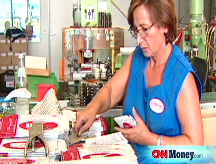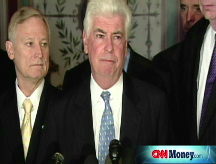Stocks rise on rescue plan
Investors welcomed reports that Congress has essentially agreed on the terms of the $700 billion bank bailout plan.
NEW YORK (CNNMoney.com) -- Stocks rallied Thursday on news that a group of key lawmakers have essentially agreed on terms of the $700 billion bank bailout plan, following days of heated debate.
Yet, credit markets showed little reaction, with short-term borrowing rates spiking as banks clung to cash. The dollar fell versus other major currencies and oil and gold prices fell.
The Dow Jones industrial average (INDU) jumped 197 points or 1.8%; it was up as much as 304 points earlier in the day. The Standard & Poor's 500 (SPX) index gained 2% and the Nasdaq composite (COMP) climbed 1.4%.
Key Congressional leaders said Thursday afternoon they have come up with a bipartisan agreement in principle on a $700 billion plan to let the Treasury buy bad mortgage assets from banks as a means of getting them to start lending again.
The deal would include many of the provisions lawmakers had been pushing for over the last few days, including help for homeowners, a limit to executive pay packages for participating companies and oversight of Treasury actions.
But late in the day, as President Bush held a White House meeting with Congressional leaders and the two major presidential candidates, there were indications that some Republicans on Capitol Hill had not signed on to the deal.(Full story)
"The perception is that we are close to getting a plan passed and that is definitely a short-term positive for the market," said Art Hogan, chief market analyst at Jefferies & Co.
He said stocks will probably see a bigger advance after a deal is "signed, sealed, delivered," but that any reaction is likely to be short-lived, as has been the market's recent history.
Hogan cited the very brief market euphoria that followed other recent government interventions, including the takeover of Fannie Mae and Freddie Mac and the rescue of AIG.
He said that once the celebration is over Wall Street will have to come back to the "harsh reality" of slow global and domestic economic growth and sluggish corporate earnings.
That harsh reality was demonstrated by Thursday's economic and corporate news, although stock investors showed almost no reaction. However, in the credit markets, broader worries remained evident.
On the economic front, new home sales fell to a 17-year low, weekly jobless claims hit a seven-year high and durable goods orders showed a big drop. In corporate news, GE (GE, Fortune 500) warned that current-quarter and full-year earnings won't meet forecasts. But shares rose 4.4%.
Credit markets: Businesses depend on the credit markets to function on a daily basis, and the absence of ready capital has threatened to stall the broader financial system.
The Libor rate, which measures what banks charge each other for overnight loans, showed the biggest one-day jump in nearly a decade, according to the New York Times.
And the TED spread, a measure of financial market jitters, briefly hit its highest point in at least 22 years, before retreating.
The TED spread is the difference between what the Treasury pays to borrow for three months and what banks charge each other. If banks think the system is solid, they should be willing to lend to each other on almost the same terms as money lent to the U.S. government. When they ask for a big interest rate premium, that tells you they're worried. (For more, click here).
The three-month Treasury bill, seen as the safest place to park money in the short term, rose to 0.75% from 0.35% earlier in the session following news that the rescue plan is progressing. Last week, the three-month bill fell to a 68-year low around 0% as panic gripped financial markets.
Longer-term treasury prices also fell Thursday, raising the yield on the benchmark 10-year note to 3.85% from 3.80% late Wednesday. Treasury prices and yields move in opposite directions.
Treasury prices have been rallying recently and yields tumbling as nervous stock market investors have looked for safer areas to move their cash.
(For a look at how tighter credit conditions have been impacting individuals, click here.)
Bank bailout: Stocks seesawed Wednesday as the bank rescue plan hit an impasse. But optimism was restored Thursday after President Bush's speech Wednesday night and comments from congressional lawmakers Thursday.
"People are fairly confident that something will pass and if it does, that's going to help calm the market," said Dave Hinnenkamp, CEO at KDV Wealth Management.
President Bush said Wednesday night that the country could slip into a "financial panic" without swift action. Secretary Treasury Henry Paulson and Fed Chairman Ben Bernanke warned Congress that failure to act could prove disastrous for the economy, businesses and individuals.
But lawmakers had been skeptical of the size and scope of the package and whether it would protect taxpayers.
The bailout follows an extraordinary week in which Lehman Brothers (LEH, Fortune 500) filed the biggest bankruptcy ever, Bank of America (BAC, Fortune 500) bought Merrill Lynch (MER, Fortune 500) and AIG (AIG, Fortune 500) survived only after the Fed's $85 billion bridge loan.
The government stepped in to aid Bear Stearns last March and Fannie Mae and Freddie Mac earlier this month.
The government is reportedly also helping to broker a deal for troubled Washington Mutual (WM, Fortune 500), the nation's largest savings and loan firm. Shares had jumped in the morning on reports that WaMu was talking to private equity firms about a buyout. But the stock crumbled in the afternoon as buyout hopes faded.
Oil and gold: U.S. light crude oil for November delivery rose $2.29 to settle at $108.02 a barrel on the New York Mercantile Exchange after tumbling in the morning.
Oil prices had plummeted over $55 after peaking at $147.27 a barrel on July 11, as investors bet that sluggish global growth will diminish oil demand. But prices have soared in the last few weeks as the financial crisis has intensified and investors sought to put their money into hard assets.
COMEX gold for December delivery fell $13 to settle at $882 an ounce. Like oil, gold prices had also rallied during the biggest periods of unrest over the last few weeks
Other markets: In currency trading, the dollar fell against the euro and the yen.
Gas prices fell for the eighth day in a row, according to a nationwide survey of credit card activity. (Full story).
In global trade, European markets rallied and Asian markets ended lower. ![]()




